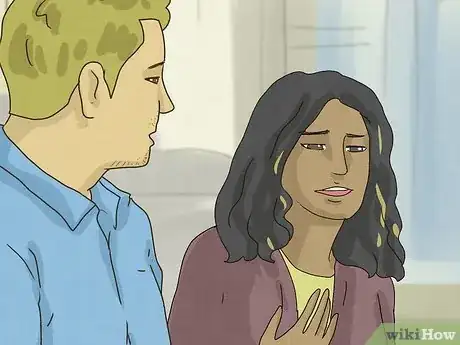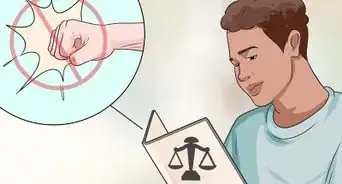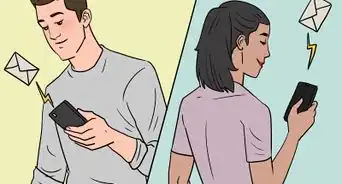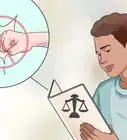This article was co-authored by Asa Don Brown, PhD, DNCCM, FAAETS and by wikiHow staff writer, Jessica Gibson. Dr. Asa Don Brown is a Clinical Psychologist with over 25 years of experience. He specializes in working with families, children, and couples, treating a variety of psychological disorders, trauma, and abuse. Dr. Brown has specialized in negotiation and profiling. He is also a prolific author having published three books and numerous articles in magazines, journals, and popular publications. Dr. Brown earned a BS in Theology and Religion with a minor in Marketing and an MS in Counseling with a specialization in Marriage and Family from The University of Great Falls. Furthermore, he received a PhD in Psychology with a specialization in Clinical Psychology from Capella University. He is also a candidate for a Masters of Liberal Arts through Harvard University. Dr. Brown is a Fellow of the American Academy of Experts in Traumatic Stress and a Diplomate for the National Center for Crisis Management and continues to serve a number of psychological and scientific boards.
This article has been viewed 41,758 times.
Being called a good girl isn't a new experience for most women, but it can leave you wondering what the person meant. Such a small phrase can be used in lots of contexts, so it's important to understand someone's motivation for using it. Don't worry—we'll help you decipher the meaning and come up with the best response for your exact situation.
Steps
Expert Q&A
-
QuestionHow can I be more assertive without being aggressive?
 Asa Don Brown, PhD, DNCCM, FAAETSDr. Asa Don Brown is a Clinical Psychologist with over 25 years of experience. He specializes in working with families, children, and couples, treating a variety of psychological disorders, trauma, and abuse. Dr. Brown has specialized in negotiation and profiling. He is also a prolific author having published three books and numerous articles in magazines, journals, and popular publications. Dr. Brown earned a BS in Theology and Religion with a minor in Marketing and an MS in Counseling with a specialization in Marriage and Family from The University of Great Falls. Furthermore, he received a PhD in Psychology with a specialization in Clinical Psychology from Capella University. He is also a candidate for a Masters of Liberal Arts through Harvard University. Dr. Brown is a Fellow of the American Academy of Experts in Traumatic Stress and a Diplomate for the National Center for Crisis Management and continues to serve a number of psychological and scientific boards.
Asa Don Brown, PhD, DNCCM, FAAETSDr. Asa Don Brown is a Clinical Psychologist with over 25 years of experience. He specializes in working with families, children, and couples, treating a variety of psychological disorders, trauma, and abuse. Dr. Brown has specialized in negotiation and profiling. He is also a prolific author having published three books and numerous articles in magazines, journals, and popular publications. Dr. Brown earned a BS in Theology and Religion with a minor in Marketing and an MS in Counseling with a specialization in Marriage and Family from The University of Great Falls. Furthermore, he received a PhD in Psychology with a specialization in Clinical Psychology from Capella University. He is also a candidate for a Masters of Liberal Arts through Harvard University. Dr. Brown is a Fellow of the American Academy of Experts in Traumatic Stress and a Diplomate for the National Center for Crisis Management and continues to serve a number of psychological and scientific boards.
Clinical Psychologist Focus on having a healthy attitude, perception, and desire. Assertiveness is all about about approaching someone with respect, while aggressiveness lacks empathy, compassion, or consideration for the other person.
Focus on having a healthy attitude, perception, and desire. Assertiveness is all about about approaching someone with respect, while aggressiveness lacks empathy, compassion, or consideration for the other person. -
QuestionHow can I be assertive without rude?
 Asa Don Brown, PhD, DNCCM, FAAETSDr. Asa Don Brown is a Clinical Psychologist with over 25 years of experience. He specializes in working with families, children, and couples, treating a variety of psychological disorders, trauma, and abuse. Dr. Brown has specialized in negotiation and profiling. He is also a prolific author having published three books and numerous articles in magazines, journals, and popular publications. Dr. Brown earned a BS in Theology and Religion with a minor in Marketing and an MS in Counseling with a specialization in Marriage and Family from The University of Great Falls. Furthermore, he received a PhD in Psychology with a specialization in Clinical Psychology from Capella University. He is also a candidate for a Masters of Liberal Arts through Harvard University. Dr. Brown is a Fellow of the American Academy of Experts in Traumatic Stress and a Diplomate for the National Center for Crisis Management and continues to serve a number of psychological and scientific boards.
Asa Don Brown, PhD, DNCCM, FAAETSDr. Asa Don Brown is a Clinical Psychologist with over 25 years of experience. He specializes in working with families, children, and couples, treating a variety of psychological disorders, trauma, and abuse. Dr. Brown has specialized in negotiation and profiling. He is also a prolific author having published three books and numerous articles in magazines, journals, and popular publications. Dr. Brown earned a BS in Theology and Religion with a minor in Marketing and an MS in Counseling with a specialization in Marriage and Family from The University of Great Falls. Furthermore, he received a PhD in Psychology with a specialization in Clinical Psychology from Capella University. He is also a candidate for a Masters of Liberal Arts through Harvard University. Dr. Brown is a Fellow of the American Academy of Experts in Traumatic Stress and a Diplomate for the National Center for Crisis Management and continues to serve a number of psychological and scientific boards.
Clinical Psychologist The best approach is to always use verbal and nonverbal language centered on bonding and unifying, rather than dividing. Always use I-statements to explain how you're feeling, and keep an eye on your body language throughout the conversation.
The best approach is to always use verbal and nonverbal language centered on bonding and unifying, rather than dividing. Always use I-statements to explain how you're feeling, and keep an eye on your body language throughout the conversation.
References
- ↑ https://www.lovedignity.com/50-sexting-example-ideas-to-turn-a-girl-on/
- ↑ https://futurewomen.com/hotlists/5-examples-everyday-sexism/
- ↑ https://www.psychologytoday.com/us/blog/myths-desire/201909/without-flirting-it-wouldnt-be-marriage
- ↑ https://futurewomen.com/hotlists/5-examples-everyday-sexism/
- ↑ https://everydayfeminism.com/2015/06/grown-women-are-not-girls/





































































